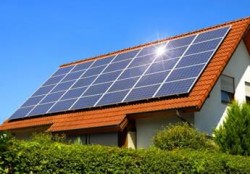Energy costs seem to be steadily on the rise. Concurrently, due to increasing marketing and decreasing installation costs, photovoltaic (PV) systems, or solar panels, are becoming more popular nationwide.
Depending on the neighborhood, one can easily see more homes of all sizes with  roof-top solar panels. The benefits of solar panels are clear. Free energy from the sun, lower utility bills, and less dependence on public utility providers make solar panels hard to argue against.
roof-top solar panels. The benefits of solar panels are clear. Free energy from the sun, lower utility bills, and less dependence on public utility providers make solar panels hard to argue against.
Yet with the increasing popularity of solar panels, some homeowners, depending on how they acquired a PV system, are finding an unexpected obstacle when they go to sell their home, which can end up costing them money.
When homeowners consider installing solar panels, they generally have three options:
Purchase – Panels are bought outright, or financed.
Lease – Panels from the solar company, often with zero down payment, then a set monthly lease cost.
PPA (Power Purchase Agreement) – Similar to a lease, but with some money upfront, then a set electric rate.
There are benefits to a lease or PPA in that the homeowner does not have to worry about maintenance on the panels. Additionally, these options open up solar energy to many more homeowners who may not wish to purchase the panels.
When it comes to owning solar panels, there is evidence they increase the value of a home. A recent study by the Lawrence Berkeley National Laboratory concluded, on average, each kilowatt of installed solar energy garners an estimated $5,900 premium in value at the time of sale.
With solar leases, however, some homeowners, at the time of sale, are finding their solar panels are costing them money and causing headaches. Like any lease, solar-leases are under contract for a specific amount of time. If the homeowner decides to sell, the home buyer must qualify on their own through the solar-lease provider.
Prospective buyers of homes with a solar-lease will need to have stellar credit. If they do qualify, but are financing the purchase of the home, the added cost of the lease may actually exceed the monthly amount their lender originally approved, thereby killing the deal. At that point, the home seller has the choice to either look for a new buyer, or lower the home’s price to make the deal work, as some homeowners are finding recently.
Despite the possible difficulties caused by a solar lease, they are not something a homeowner should fear. Unfortunately, many consumers are not being thoroughly educated about the pros and cons of purchasing versus leasing.
Solar is certainly an excellent tool to increase the energy efficiency of a home, however it is not the only tool. There are many options of varying degrees of complexity and investment available to a homeowner as well as rebates and incentives to offset costs.
It is crucial that someone considering installing solar educate themselves to find the system that works best for them.
Leave a Reply